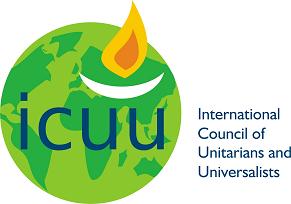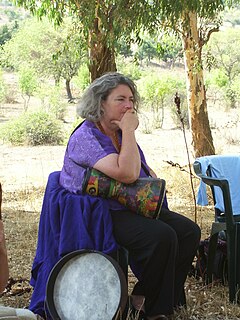
The Canadian Unitarian Council (CUC) is a liberal religious association of Unitarian and Unitarian Universalist congregations in Canada. It was formed on May 14, 1961, initially to be the national organization for Canadians belonging to the Unitarian Universalist Association (UUA) which formed a day later on May 15, 1961. Between 1961 and 2002, almost all member congregations of the CUC were also members of the UUA and most services to congregations in Canada were provided by the UUA. However, in 2002, the CUC formally became a separate entity from the UUA, although the UUA continues to provide ministerial settlement services. Some Canadian congregations have continued to be members of both the CUC and the UUA, while most congregations are only members of the CUC.

The International Council of Unitarians and Universalists (ICUU) was an umbrella organization founded in 1995 comprising many Unitarian, Universalist, and Unitarian Universalist organizations. It was disolved in 2021 along with the Unitarian Universalist Partner Church Council to make way for a new merged entity. Some groups represented only a few hundred people; while the largest, the Unitarian Universalist Association, had more than 160,000 members as of May 2011—including over 150,000 in the United States.

Unitarian Universalist Association (UUA) is a liberal religious association of Unitarian Universalist congregations. It was formed in 1961 by the consolidation of the American Unitarian Association and the Universalist Church of America, both Protestant Christian denominations with Unitarian and Universalist doctrines, respectively. However, modern Unitarian Universalists see themselves as a separate religion with its own beliefs and affinities. They define themselves as non-creedal, and draw wisdom from various religions and philosophies, including humanism, pantheism, Christianity, Hinduism, Buddhism, Taoism, Judaism, Islam, and Earth-centered spirituality. Thus, the UUA is a syncretistic religious group with liberal leanings.

Unitarian Universalism (UU) is a liberal religion characterized by a "free and responsible search for truth and meaning". Unitarian Universalists assert no creed, but instead are unified by their shared search for spiritual growth, guided by a dynamic, "living tradition". Currently, these traditions are summarized by the Six Sources and Seven Principles of Unitarian Universalism, documents recognized by all congregations who choose to be a part of the Unitarian Universalist Association. These documents are "living", meaning always open for revisiting and reworking. Unitarian Universalist (U.U.) congregations include many atheists, agnostics, and theists and have churches, fellowships, congregations, and societies around the world. The roots of Unitarian Universalism are in protestant liberal Christianity, specifically unitarianism and universalism. Unitarian Universalists state that from these traditions comes a deep regard for intellectual freedom and inclusive love. Congregations and members seek inspiration and derive insight from all major world religions.
Unitarianism is a nontrinitarian branch of Christian theology. Most other branches of Christianity and the major Churches accept the Nicene Creed's statement of homoousion: one being in three hypostases: the Father, Son, and Holy Spirit. Unitarian Christians believe that Jesus was inspired by God in his moral teachings and that he is a savior, but not divine.
Unitarian or Unitarianism may refer to:

Starhawk is an American feminist and author. She is known as a theorist of feminist Neopaganism and ecofeminism. She is a columnist for Beliefnet.com and for On Faith, the Newsweek/Washington Post online forum on religion. Her book The Spiral Dance (1979) was one of the main inspirations behind the Goddess movement. In 2013, she was listed in Watkins' Mind Body Spirit magazine as one of the 100 Most Spiritually Influential Living People.
The General Assembly of Unitarian and Free Christian Churches is the umbrella organisation for Unitarian, Free Christians, and other liberal religious congregations in the United Kingdom and Ireland. It was formed in 1928, with denominational roots going back to the Great Ejection of 1662. Its headquarters is Essex Hall in central London, on the site of the first avowedly Unitarian chapel in England, set up in 1774.

The Covenant of Unitarian Universalist Pagans (CUUPS) is an association of Unitarian Universalists who identify with the precepts of classical or contemporary Paganism: celebrating the sacred circle of life and guiding people to live in harmony with the rhythms of nature. CUUPS members foster the development of "liturgical materials based on earth- and nature-centered religious and spiritual perspectives" as well as encourage "greater use of music, dance, visual arts, poetry, story, and creative ritual in Unitarian Universalist worship and celebration."
The Earth Charter is an international declaration of fundamental values and principles considered useful by its supporters for building a just, sustainable, and peaceful global society in the 21st century. Created by a global consultation process, and endorsed by organizations representing millions of people, the Charter "seeks to inspire in all peoples a sense of global interdependence and shared responsibility for the well-being of the human family, the greater community of life, and future generations." It calls upon humanity to help create a global partnership at a critical juncture in history. The Earth Charter's ethical vision proposes that environmental protection, human rights, equitable human development, and peace are interdependent and indivisible. The Charter attempts to provide a new framework for thinking about and addressing these issues. The Earth Charter Initiative organization exists to promote the Charter.

Liberal Religious Youth (LRY) was an autonomous, North American youth organization affiliated with the Unitarian Universalist Association (UUA). LRY was unique as a church youth group in that it was governed solely by its members, who were generally between the ages of fourteen and nineteen years old, with adults serving only in an advisory capacity. Though partial funding and office space were provided by the UUA, primary funding was through an independent endowment, the investment of which was controlled by the LRY board of directors.
Circle Sanctuary is a non-profit organization and legally recognized neopagan church based in southwestern Wisconsin, US. It aims to encourage community celebrations, spiritual healing, research, networking and education.
Neopaganism in the United States is represented by widely different movements and organizations. The largest Neopagan religious movement is Wicca, followed by Neodruidism. Both of these religions or spiritual paths were introduced during the 1950s and 1960s from Great Britain. Germanic Neopaganism and Kemetism appeared in the US in the early 1970s. Hellenic Neopaganism appeared in the 1990s.
Young Religious Unitarian Universalists (YRUU) is a term used within the Unitarian Universalist Association (UUA) in the United States and formerly the Canadian Unitarian Council. YRUU was an organization at the continental level primarily run by youth, ranging in age from 14 to 20, with mentoring adult partners. The continental organization of YRUU ended in 2008, but the term is still used by certain active youth groups and conferences at the congregational and district levels.

All Souls Unitarian Church is a Unitarian Universalist (UU) church in Tulsa, Oklahoma. It is one of the largest UU congregations in the world.
The Eno River Unitarian Universalist Fellowship (ERUUF) is a Unitarian Universalist (UU) congregation located in Durham, North Carolina. In 2018, over seven hundred people were members of ERUUF, making it the largest UU congregation in NC and one of the largest in the UUA. It sponsors the UU campus ministry program at Duke University, Unitarian Universalist Fellowship @ Duke.

Religion in Louisville, Kentucky, includes religious institutions of various faiths; including Christianity, Judaism, Islam, Hinduism, Buddhism and Sikhism.

Modern paganviews on LGBT people vary considerably among different paths, sects, and belief systems. LGBT individuals comprise a much larger percentage of the population in neopagan circles than larger, mainstream religious populations. There are some popular neopagan traditions which have beliefs often in conflict with the LGBT community, and there are also traditions accepting of, created by, or led by LGBT individuals. The majority of conflicts concern heteronormativity and cisnormativity.










